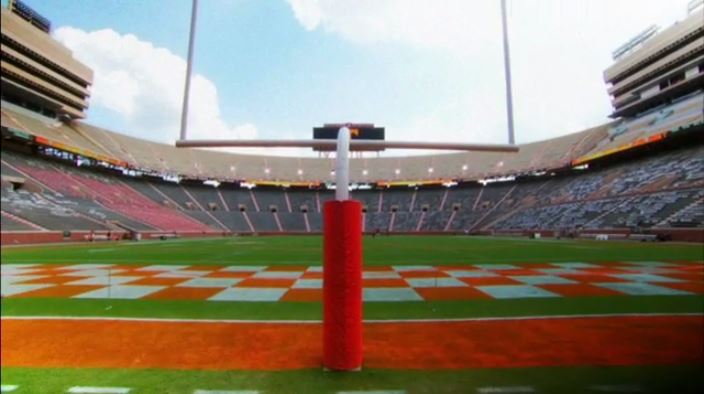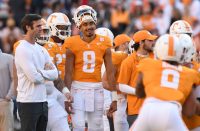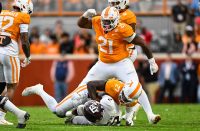In the quiet of the early summer, we’ve often spent time with Tennessee’s history. Way back in the summer of 2009 at Rocky Top Talk, we counted down the 50 Best Games of the Fulmer Era. The following year we looked at Tennessee’s 20 Most Heartbreaking Losses from 1990-2009. I’ve been going back through the latter this week, comparing some of our toughest losses in the nine years since to see where they might rank. We’ll do that exercise in full later this week, but I want to start with one game in particular.
I was a history major; even as an idiot optimist, I believe there is value in examining our toughest defeats. But what qualifies a game for that list can and will change, specifically based on the quality and quantity of victory surrounding it.
Case in point: how do you feel about this game, nine years later?
So it’s still no fun to watch, of course. But how do you think of it in the context of the last ten years?
When we did our original list of the 20 most heartbreaking losses from 1990-2009, we ranked this game #11, and almost apologized for having it that low. Recency bias was a factor, even with Lane Kiffin out and Derek Dooley in when we did the original list. But in the summer of 2010, we placed it above heart-breakers like the 1990 tie with Auburn and four Florida losses (1996, 1997, 1999, 2002).
This week, when I was putting together my list of the ten worst losses of the last ten years, it didn’t even make the cut.
To be fair, there are more losses to choose from in the last ten years than in the 20 preceding them. That’s literally true, by the way: from 1989-2007 the Vols lost 54 times, plus their first six of the 1988 season. From 2008-2017, the Vols lost 63 times.
But here too, it’s both quantity and quality that count. Tennessee has not had much opportunity for the kind of heartbreak that dominated our old list. How we experience defeat has changed. Our worst losses used to make us mourn what we gave away. Now they make us wonder if we’ll ever get it back.
In 2009, that loss to #1 Alabama was heartbreaking. But it’s not just the sequence of events, the ranking, or the rival. In 2009, we were still attached to the idea of who Tennessee had been for all those years prior. Lane Kiffin’s 45-19 win over Georgia two weeks earlier helped us do that. And the loss to Alabama didn’t take it away; even at 7-6 at the end of the season, fans were very optimistic Kiffin could get the Vols where we wanted to go. Two losses to the number one team in the country, two others by four points each, and a bowl loss to a Virginia Tech team that finished the year fourth in S&P+. We rioted, in part, because we believed in what was happening up until the very moment it was over. And today we enjoy comparing the makeup of Jeremy Pruitt’s staff to Kiffin’s.
In the moment, the 2009 Alabama loss belongs on a list of painful near misses from a championship-caliber Tennessee program. But nine years later, 2009 isn’t the bridge between Fulmer and Kiffin on the straight and narrow road of victory. It’s Exit 2A into the ditch, and there aren’t even any good gas stations.
The program’s inability to sustain success over a decade cut a hard tie from the past, and instead created an era of its own. Viewed through the lens of 2009, the loss to Alabama is heartbreaking. Viewed through the lens of the last decade, it’s a near-miss moral victory akin to 2013 Georgia. The Vols played an equally competitive game with an equally good Alabama squad in Tuscaloosa in 2015, and I don’t think any of us would put it on a list of the ten worst losses of the last ten years either.
Losing always hurts. But it’s not just that the stakes have been lower for most of the last ten years. It’s that this ditch is long and muddy, and you need really good vision to still see the shiny objects in our rear view. At some point it became normal, and our definitions of great wins and bad losses changed based on our surroundings.
The funny thing here isn’t really funny, because we’re putting enough hope in it to take it very seriously: we asked Phillip Fulmer to get out of the car when it was teetering on the edge. Opinions still vary over how many tires were in the ditch back then. And now, after trying and failing in unique and messy ways over the course of almost a decade, Fulmer has the keys again and got to pick the driver. And when in doubt at any point over the last six months, it’s Fulmer’s presence – a shiny object out of the rear view and riding shotgun – that gives me the most hope.
There’s some mud and messiness left, no doubt. Jeremy Pruitt will chase forward progress, with wins and losses along the way this year and beyond. I hope he gets us to a point when losing to #1 Alabama by two points hurts just as much nine years later as the day it happened. And I hope for wins with an even longer memory.




